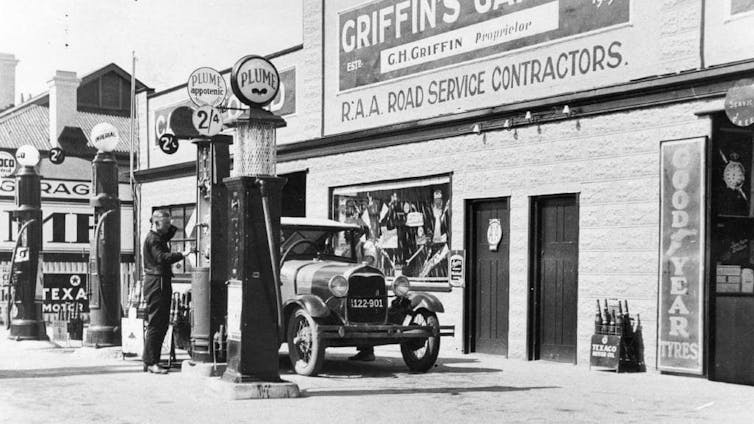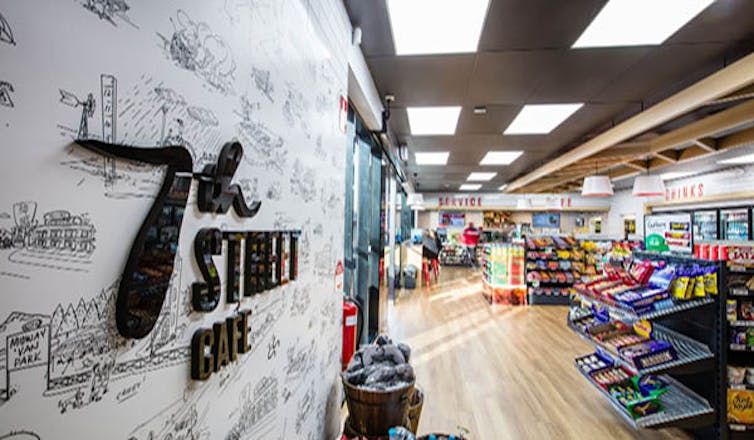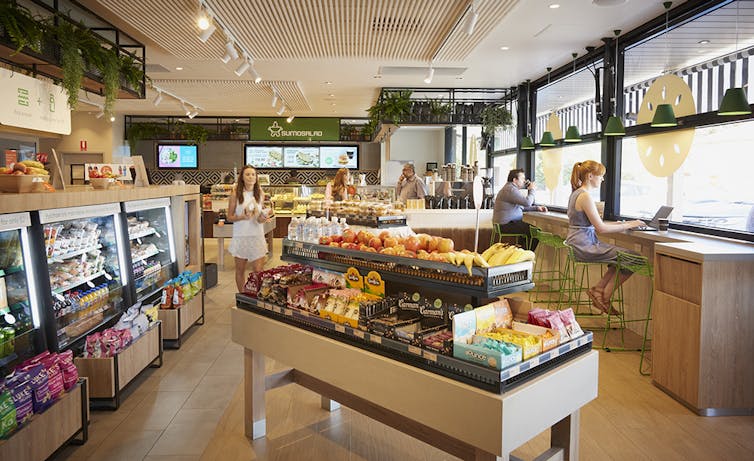Why BP is getting into bed with David Jones. The promising marriage of petrol and gourmet food
- Written by Gary Mortimer, Professor of Marketing and Consumer Behaviour, Queensland University of Technology
“Fill ’er up?”
That was the immediate greeting from the driveway attendant when pulling into the service station in the days before self-serve pumps[1].
Yes, once there was someone to pump your fuel and check your oil and water.
The colloquially named “servo[2]” actually provided service.
Then, in order to reduce operational costs and remain competitive, they became “self-service” – you pumped your own fuel, pumped your own tyres, and didn’t dare ask for mechanical assistance.
 An attendant pumps petrol at Griffin’s Garage at Victor Harbor, South Australia circa 1921.
RAA
An attendant pumps petrol at Griffin’s Garage at Victor Harbor, South Australia circa 1921.
RAA
Today’s announcement that David Jones and BP are joining forces[3] to to “create all-new centres of convenience” appears to mean servos are getting back into service, taking the focus off fuel prices and putting it back onto customer experience.
DJs loves food
David Jones has long held food ambitions[4].
Back in 2015, the new South African owner of David Jones, Woolworths Holdings (which shouldn’t be confused with Australia’s Woolworths) asked South African retailing veteran Pieter de Wet[5] to overhaul its food business.
At first he rolled out “Food Stores”, similar to British retailer Marks & Spencers “Food Halls[6]”, inside existing David Jones stores. Then earlier this year, he launched DJ’s first stand-alone food store[7] in Melbourne’s South Yarra.
Moving into fuel and convenience is a logical, although risky, move. Two service station chains have moved first.
Read more: David Jones seeks to exploit top end gap in Australian grocery[8]
Rather than competing only on fuel prices or 4 cent discounts, they are competing on “customer experience”. Stay a little longer, charge your phone and deal with some important emails. Have a barista-made espresso, or a Boost Juice. Grab a YouFoodz[9] meal to take home for dinner.
Service stations are rediscovering service
When Singapore-based multinational Puma Energy[10] entered Australia’s petrol market in 2013, it acquired Ausfuel Gull, Matilda, Neumann and Central Combined Group, making it Australia’s largest fuel retailer outside the big four; Caltex, BP, Shell and Mobil.
In 2016 it began installing 7th Street[11] artisan café and convenience stores in its service stations, offering barista-made coffee, fresh baguettes, free Wi-Fi and phone recharging stations.
 Puma Energy
Then, in 2017, Caltex also opened its first Foodary[12], offering “breakfast, lunch and dinner options to go, locally roasted barista-made coffee and goods from local businesses”.
The meal kits are from The Corner Store[13], the baked goods from Brasserie Bread[14].
Puma Energy
Then, in 2017, Caltex also opened its first Foodary[12], offering “breakfast, lunch and dinner options to go, locally roasted barista-made coffee and goods from local businesses”.
The meal kits are from The Corner Store[13], the baked goods from Brasserie Bread[14].
 Caltex
The thinking is that convenience is king.
We are more time poor[15] than ever, but we don’t want to scrimp on quality.
The same phenomenon is contributing to the growth of meal delivery services[16]. One-third of consumers are now using a restaurant or meal delivery service, and 7% get delivery once a week[17].
The “premiumisation” of convenient fast food is an enormous growth opportunity, with market research company IbisWorld[18] forecasting revenue growth of 4.7% through 2018-19 to A$7.6 billion, something David Jones wants to grab a part of in partnership with BP.
It won’t happen everywhere
Don’t expect to see a David Jones infused BP service station in your own neighbourhood any time soon.
DJs says over the next six months they will be “strategically positioned[19]” in 10 key locations in Sydney and Melbourne populated by a high proportion of “busy, urban, health-conscious customers”.
It can be thought of as customer segmentation, this time based on time and income[20].
It will fragment the fuel and convenience sector. At one end will be Coles Express and Caltex Starmart, offering value and low prices. At the other will be Caltex with The Foodary, Puma with 7th Street, and David Jones/BP offering “gourmet convenience”.
But it might take our minds off prices
Offering a premium food and customer experience will help insulate BP from the effect of high fuel prices[21].
Last week, Coles Express announced a decline of almost 70% in earnings before interest in tax. When your offer is low prices and convenience but you can’t control fuel prices, you are at risk of losing customers.
Read more:
Aussie retailers need to adapt to a world built on speed[22]
Aiming at time-poor high income motorists offers protection. People filling up their BMW don’t care whether the price is $1.50 or $1.80 a litre.
Of course while there would be winners, there would also be losers, the biggest being traditional convenience stores and second tier supermarkets bearing brands such as IGA and Foodland, supplied by the listed wholesaler Metcash[23].
The ability to zip in, fill up and grab a quality food might become another nail in the coffin of the local convenience store.
Caltex
The thinking is that convenience is king.
We are more time poor[15] than ever, but we don’t want to scrimp on quality.
The same phenomenon is contributing to the growth of meal delivery services[16]. One-third of consumers are now using a restaurant or meal delivery service, and 7% get delivery once a week[17].
The “premiumisation” of convenient fast food is an enormous growth opportunity, with market research company IbisWorld[18] forecasting revenue growth of 4.7% through 2018-19 to A$7.6 billion, something David Jones wants to grab a part of in partnership with BP.
It won’t happen everywhere
Don’t expect to see a David Jones infused BP service station in your own neighbourhood any time soon.
DJs says over the next six months they will be “strategically positioned[19]” in 10 key locations in Sydney and Melbourne populated by a high proportion of “busy, urban, health-conscious customers”.
It can be thought of as customer segmentation, this time based on time and income[20].
It will fragment the fuel and convenience sector. At one end will be Coles Express and Caltex Starmart, offering value and low prices. At the other will be Caltex with The Foodary, Puma with 7th Street, and David Jones/BP offering “gourmet convenience”.
But it might take our minds off prices
Offering a premium food and customer experience will help insulate BP from the effect of high fuel prices[21].
Last week, Coles Express announced a decline of almost 70% in earnings before interest in tax. When your offer is low prices and convenience but you can’t control fuel prices, you are at risk of losing customers.
Read more:
Aussie retailers need to adapt to a world built on speed[22]
Aiming at time-poor high income motorists offers protection. People filling up their BMW don’t care whether the price is $1.50 or $1.80 a litre.
Of course while there would be winners, there would also be losers, the biggest being traditional convenience stores and second tier supermarkets bearing brands such as IGA and Foodland, supplied by the listed wholesaler Metcash[23].
The ability to zip in, fill up and grab a quality food might become another nail in the coffin of the local convenience store.
References
- ^ before self-serve pumps (www.adelaidenow.com.au)
- ^ servo (www.harpercollins.com.au)
- ^ David Jones and BP are joining forces (www.medianet.com.au)
- ^ food ambitions (www.davidjones.com)
- ^ Pieter de Wet (www.smh.com.au)
- ^ Food Halls (www.bbc.com)
- ^ stand-alone food store (www.insideretail.com.au)
- ^ David Jones seeks to exploit top end gap in Australian grocery (theconversation.com)
- ^ YouFoodz (youfoodz.com)
- ^ Puma Energy (www.pumaenergy.com)
- ^ 7th Street (www.pumaenergy.com.au)
- ^ Foodary (www.caltex.com.au)
- ^ The Corner Store (thecornerstore.myfoodworks.com.au)
- ^ Brasserie Bread (www.brasseriebread.com.au)
- ^ time poor (www.cbre.com.au)
- ^ meal delivery services (www.mckinsey.com)
- ^ once a week (www.nielsen.com)
- ^ IbisWorld (qsrmedia.com.au)
- ^ strategically positioned (www.afr.com)
- ^ time and income (www.emerald.com)
- ^ high fuel prices (www.accc.gov.au)
- ^ Aussie retailers need to adapt to a world built on speed (theconversation.com)
- ^ Metcash (www.metcash.com)
Authors: Gary Mortimer, Professor of Marketing and Consumer Behaviour, Queensland University of Technology













